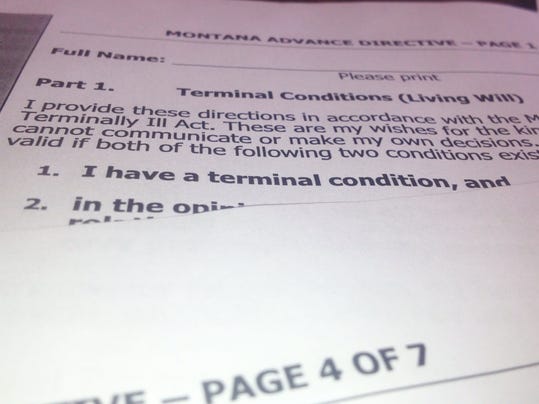Pulmonologist Dr. Rick Blevins often sees
patients and families grappling with a decision he says should have been made
long before.
Blevins treats many patients in the intensive
care unit who won't survive. If they do not have advance directives, their
families are left to make hard decisions that they may not have answers to.
"It's a subject that comes up and (in the
ICU) is the worst possible time for conversations to be initiated,"
Blevins said.
Many times, the ICU patient is unable to make
decisions for himself, so it falls on the family, Blevins said.
The role of the family in that situation is to
make the decision the patient would make, Blevins explained. But families don't
always know or don't agree.
Advance directives, such as living wills,
provide instruction to families and especially health care providers on how the
patient wants to be treated in the event of incapacity. Besides the living
will, other common forms people complete are powers of attorney for health care
that gives another person the authority to make health care decisions in the
event of incapacity of the patient, and a form called Five Wishes, which
provides not only instructions on medical care but also emotional care.
Blevins said it can be difficult not only for
families to have discussions about advance directives, but these conversations
may not be happening in the doctor's office either.
Doctors are encouraged to talk to their patients
about their health care wishes, but time constraints might prevent that, he
said.
Many advance directives are legal documents, so
lawyers can help people draw them up. But many are also available on the
Internet, and Benefis has a link to the Five Wishes form on its website.
The POLST form, which stands for Provider Orders
for Life-Sustaining Treatment, is available for patients who have a serious
illness and provides instructions on how they want to be treated in an
emergency situation. It can be filled out by a provider only in consult with
the patient.
Sue Rose, the State Health Insurance Assistance Program, or
SHIP, coordinator for Area VIII Agency on Aging in Cascade County, said she can
assist seniors who want to fill out advance directives.
All the services provided are free.
Rose explained that SHIP can provide assistance
with Medicare and other health insurance, possible Medicare fraud and long-term
care assistance, including advance directives.
While Rose can't offer legal advice, she is able
to explain to seniors the purpose of the forms and help them fill the forms
out. Work on advance directives is done one-on-one, but Rose gives group
presentations periodically.
"We have so many resources to get people
connected," said Rose.
Rose said most of the people who come to her for
help are aware of what the advance directives do and what they want.
"You also get cold calls where people say,
'I don't know anything. What do I do?'" Rose said.
Eleven agencies on aging exist across the state,
and among them all areas of the state are covered. Area VIII covers Cascade
County only. All 11 of the agencies have SHIP programs, Rose said.
All these services are free, including notary
services, she said.
Blevins encourages people to talk to their
doctors and families about advance directives. He also advises people not to
wait. Young people need advance directives too, he said, and it is important to
make wishes explicitly known.
"People's definitions are different,"
he said.
Montana has an End-of-Life Registry online that
is available through the Department of Justice. The secure database acts as a
depository for advance directives. More information is available at https://doj.mt.gov/consumer/end-of-life-registry/.
Blevins also recommends speaking with a lawyer
about advance directives, and once they are completed, keeping copies with your
lawyer, family, doctor and local hospital.
 RSS Feed
RSS Feed Twitter
Twitter

0 comments:
Post a Comment